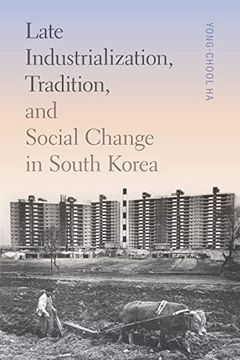Compartir
Late Industrialization, Tradition, and Social Change in South Korea (Korean Studies of the Henry m. Jackson School of International Studies) (en Inglés)
Yong-Chool Ha (Author) Clark W. Sorensen (Series Editor) (Autor)
·
University Of Washington Press
· Tapa Blanda
Late Industrialization, Tradition, and Social Change in South Korea (Korean Studies of the Henry m. Jackson School of International Studies) (en Inglés) - Yong-Chool Ha (Author) Clark W. Sorensen (Series Editor)
36,98 €
38,93 €
Ahorras: 1,95 €
Elige la lista en la que quieres agregar tu producto o crea una nueva lista
✓ Producto agregado correctamente a la lista de deseos.
Ir a Mis ListasSe enviará desde nuestra bodega entre el
Miércoles 05 de Junio y el
Viernes 07 de Junio.
Lo recibirás en cualquier lugar de España entre 1 y 5 días hábiles luego del envío.
Reseña del libro "Late Industrialization, Tradition, and Social Change in South Korea (Korean Studies of the Henry m. Jackson School of International Studies) (en Inglés)"
South Korea's rapid industrialization occurred with the rise of powerful chaebǒl (family-owned business conglomerates) that controlled vast swaths of the nation's economy. Leader Park Chung Hee's sense of backwardness and urgency led him to rely on familial, school, and regional ties to expedite the economic transformation. Late Industrialization, Tradition, and Social Change in South Korea elucidates how a country can progress economically while relying on traditional social structures that usually fragment political and economic vitality. The book proposes a new framework for macro social change under late industrialization by analyzing the specific process of interactions between economic tasks and tradition through the state's mediation.Drawing on interviews with bureaucrats in the Ministry of Commerce and Industry as well as workers and others, Yong-Chool Ha demonstrates how the state propelled industrialization by using kinship networks to channel investments and capital into chaebǒl corporations. What Ha calls "neofamilism" was the central force behind South Korea's economic transformation as the state used preindustrial social patterns to facilitate industrialization. Ha's account of bureaucracy, democratization, and the middle class challenges assumptions about the universal outcomes of industrialization.
- 0% (0)
- 0% (0)
- 0% (0)
- 0% (0)
- 0% (0)
Todos los libros de nuestro catálogo son Originales.
El libro está escrito en Inglés.
La encuadernación de esta edición es Tapa Blanda.
✓ Producto agregado correctamente al carro, Ir a Pagar.

